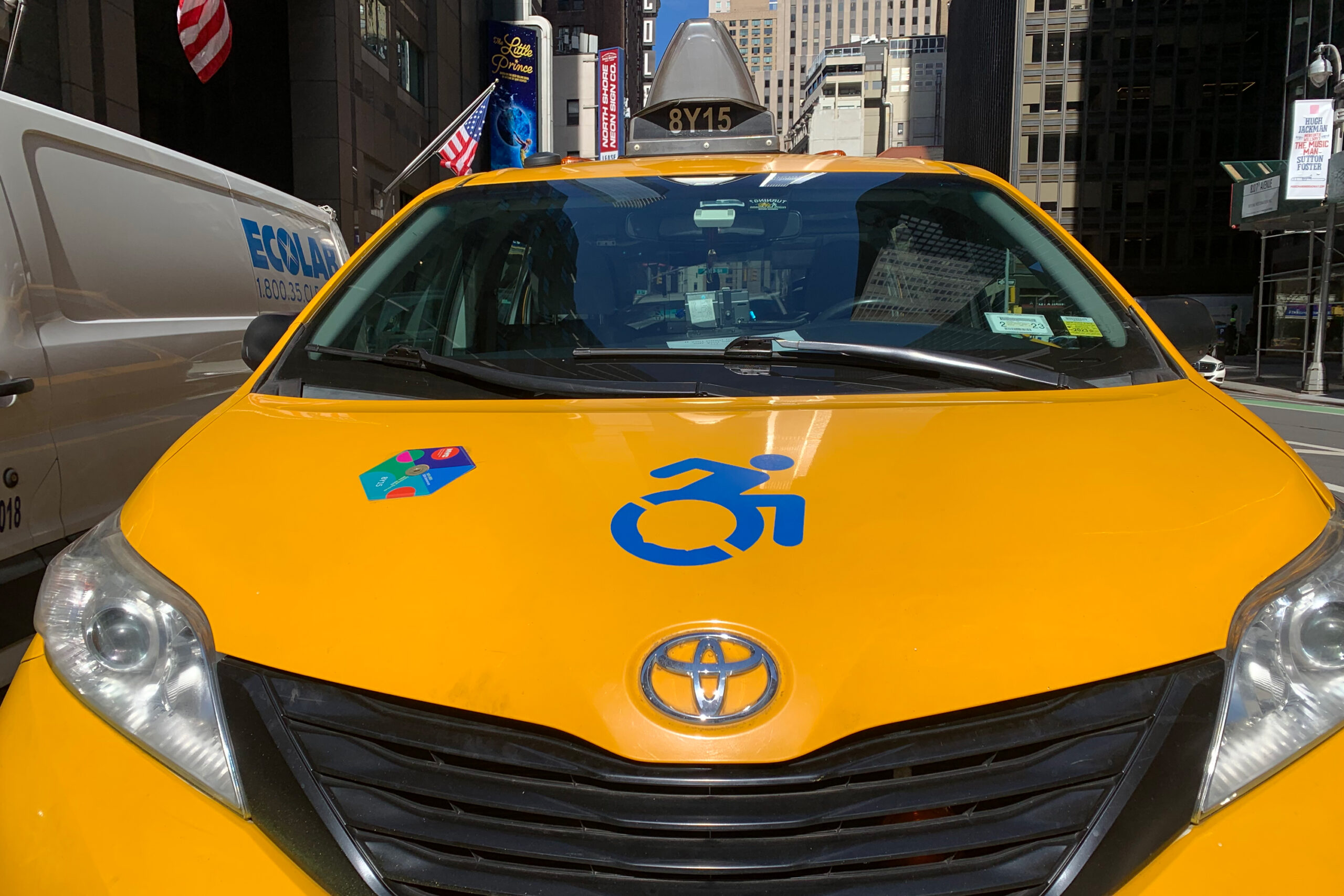TLC Blows by Deadline in Struggle to Get 50% of City Taxis Wheelchair Accessible

The city has yet to meet its mandate to make half of all yellow taxicabs accessible to people in wheelchairs and scooters — after blowing a 2020 deadline set nearly a decade ago by the settlement of a federal class-action lawsuit.
The landmark 2013 deal, which called for 50% of the 13,587 medallion cabs to be accessible two years ago, was celebrated at the time as the “first of its kind in the country.”
But with the industry in a long-running state of upheaval due, in part, to the rise of the app-based services Uber and Lyft — whose number of vehicles went unchecked for years — there are fewer taxis on the road, with the stock of vehicles equipped for wheelchairs also dwindling.
“We’ve been seeing the number of vehicles pulled out of active fleets going up and the number of active medallions going down,” said Stuart Seaborn, managing director of litigation for Disability Rights Advocates, a nonprofit legal center which represents the plaintiffs. “So it’s just going to be a lower overall number.”
An analysis by THE CITY of Taxi and Limousine Commission data shows that only 2,719 of the 7,309 yellow taxicabs that were in service as of Tuesday — or 37% — were wheelchair accessible.
Meanwhile, the deadline to make half of all medallion taxis, including those in storage, accessible has been pushed back to June 30, 2023, according to court documents filed last year in the Taxis For All Campaign’s case against the TLC.
The commission does not say how many medallions are presently in storage, but those that are still in service face a January 1, 2023 deadline.
“Every time the city has an obligation to the disability community, something always goes wrong,” said Dustin Jones, 33, a Chelsea wheelchair user who describes taxis as his “basic mode of transportation.”
He added, “It’s very sad.”
‘A Shrinking Number’
According to a 2021 TLC report to the City Council, the city’s Taxi Improvement Fund has collected more than $170 million in 30-cent surcharges since 2015 to provide owners and drivers of yellow taxicabs with incentives to make their vehicles wheelchair accessible.
The TLC said the fund also gives owners $14,000 when they put a new wheelchair accessible vehicle on the road, plus up to $4,000 annually for maintenance.
In addition, the commission uses the money for the Citywide Accessible Dispatch program, which provides on-demand, door-to-door accessible yellow and green taxi trips that will go as far as Westchester County, Nassau County or the three regional airports.
An amendment to the 2013 settlement also includes enhanced training for cabbies on how to operate the equipment that allows wheelchairs and scooters to enter and exit the vehicles.
But the turbulence around an industry further strained by decreased demand during the pandemic has had an impact on the goals laid out in 2013.
“Even if the TLC had reached the 50% mark, as it should have, we’re talking about a shrinking number of yellow cabs that are accessible,” said Joseph Rappaport of the Taxis For All Campaign, one of the four disability rights organizations that first filed the lawsuit in 2011. “And that’s a problem.”
Three years ago, TLC figures show, there were 2,724 wheelchair-accessible taxis on the road — 5 more than there are now. By early March 2020, the number climbed to 3,195 accessible taxis. A year later, the pandemic had driven that down to 1,885.
“There is still a need to enforce this settlement,” Seaborn said. “Even if you end up with something around the range of 4,000 accessible vehicles, that’s still 4,000 vehicles and that is worth fighting for.”
There is no 50% accessibility requirement for ride-hailing apps such as Uber and Lyft, and according to TLC data, as of Tuesday, only 3,600 of the more than 93,400 black and livery cars in the city are wheelchair accessible.
TLC-licensed for-hire vehicle bases are required only to provide equivalent service to passengers who request a wheelchair accessible vehicle.
Better Than Nothing
In a statement to THE CITY, the TLC said “accessibility and inclusivity are critical priorities.”
“We are working actively to meet our accessibility goals as quickly as possible,” the agency wrote in an unsigned email. “The COVID-19 pandemic was deeply disruptive to an already struggling taxi industry, but with the city moving towards recovery, we are moving this important work forward and aiming to meet those goals.”
Green taxis that are licensed to pick up street hails in the boroughs and north of East 96th Street and West 110th streets in Manhattan are also struggling to meet their state legislature mandate of being 20% accessible.
According to TLC data, as of Tuesday, only 69 of 1,418 green taxis are equipped for wheelchairs — in spite of more than $17 million going into a separate fund between 2015 and May of last year for accessibility improvements to those vehicles.
“When I was living in The Bronx, I couldn’t get an accessible green taxi anywhere,” Jones said.
Rappaport, of the Taxis For All Campaign, credited the lawsuit for “real progress” in improving accessibility from 2013.
“The lawsuit, though it has not worked perfectly, did make a huge difference,” he said.
At the time of the settlement, merely 231 of the city’s more than 13,000 taxicabs were wheelchair accessible, so the number has increased more than tenfold.
“Finding one was like a freaky thing,” said Jean Ryan, the president of Disabled In Action, which is also part of the lawsuit. “It was like an Elvis sighting.”
Ryan, a motorized wheelchair user who lives in Bay Ridge, said she is not optimistic that the city will be able to meet the 50% mandate by the start of 2023.
“Fifty percent is way better than nothing, but we saw it as a stepping stone,” she told THE CITY. “We just didn’t foresee that it would take so long.”
Jones called the delay “disrespectful” to the memory of Edith Prentiss, a longtime disability rights advocate wheelchair user who was head of the Taxis for All Campaign.
“This was her baby,” he said.
Prentiss died last March at age 69.
“She worked very, very hard to finally get an agreement and look where we are now,” he said. “Knowing the Edith Prentiss that I know, if she were still alive, she would have been cursing up a storm.”
This article was originally posted on TLC Blows by Deadline in Struggle to Get 50% of City Taxis Wheelchair Accessible



